A devastating earthquake in Turkey and Syria claims over 15,000 lives PAGE 2
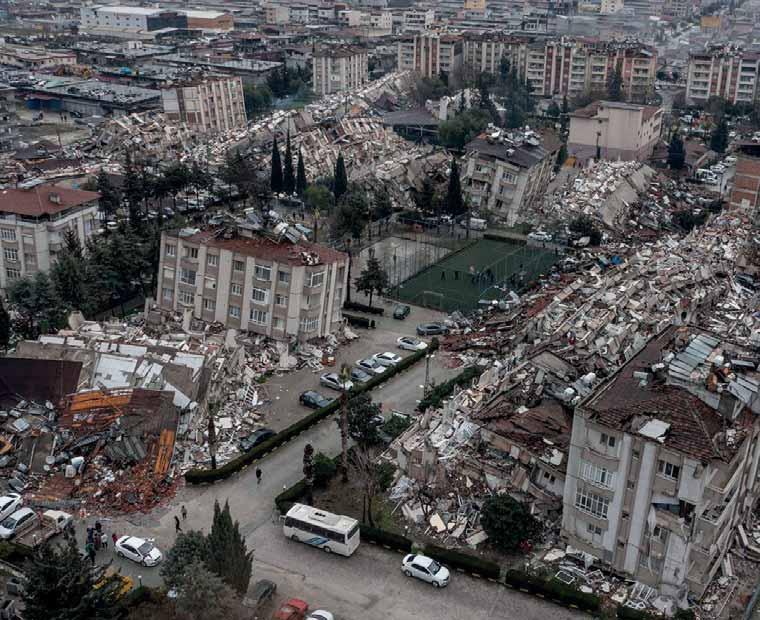
Photos source: www.edition.cnn.com
President: With Court's Decision, Georgian People Now Sentenced to Remain Hostages to the Situation
T
President Zurabishvili said that everyone should "stop speculating and playing with the future of this country, take responsibility and stop damaging the face of Georgia."
Her statement reads:
"On February 6, Tbilisi City Court chose not to postpone the sentence of Mikheil Saakashvili.
"The President does not and cannot discuss the justice/injustice of this decision, but the political assessment of this decision is up to all of us - one thing is clear: That with this decision, the Georgian people were sentenced to go around in a closed circle and remain hostage to this situation.
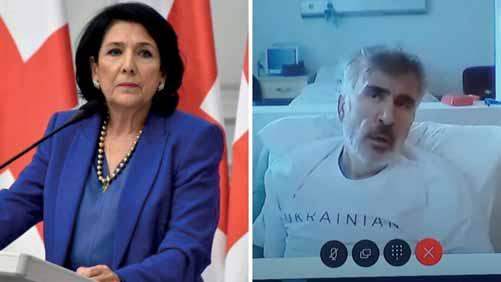
"The unprecedented discrediting of the country continues. It prevents the development of our relations with our partners in the right way; prevents us from expressing our solidarity towards the Ukrainian people and the country
he President of Georgia, Salome Zurabishvili, states that with this week's decision of the Tbilisi City Court not to postpone the sentence of former President Mikheil, "the Georgian people were sentenced to go around in a closed circle and remain hostage to this situation."during this most difficult trial; damages the Georgian tradition; prevents our recognized European perspective; prevents us from working on the 12 recommendations and their implementation, thus our candidate status.
"The country is hostage to this one and only issue. At this time, all other crucial issues for
us are not even discussed at the public level. The necessary strategy is not being developed by the government neither on the growing trends of the outflow of our manpower, mostly young people, nor on the mass influx from Russia and preventing its possible threats.
PRICE:
Ukraine Latest: Moscow Moving Troops into East ahead of Expected Offensive
NEWS PAGE 2
Oleksandra Matviichuk on Ukrainians Seeking Justice
POLITICS PAGE 4
A Difficult Year for Georgia’s Occupied Regions
Innovative Science, Environmental Protection, Safety


BUSINESS PAGE 6
EU and UNDP Support Urban Renewal, Tourism and Education in 6 Municipalities
SOCIETY PAGE 9
Better and Safer Roads for Georgia: Georgia Launches Nationwide Road Safety Campaign with EU Support
SOCIETY PAGE 11
PreparedforGeorgiaTodayBusinessby
Continued on page 3 Markets of Feb BONDSPricew/wm/mSTOCKSPricew/wm/m GRAIL 07/2888.87 (YTM 6.49%) +0,5%+1,4% Bank of Georgia (BGEO LN)GBP 27.00 +0,6% 0,7% GEBGG 07/23100.18 (YTM 5.60%) 0,1% 0,3% Georgia Capital (CGEO LN)GBP 7.56 +2,7%+5,0% GEOCAP 03/2497.23 (YTM 8.85%) +0,5%+2,1% TBC Bank Group (TBCG LN)GBP 24.65 +3,6%+11,8% SILNET 01/2798.43 (YTM 8.85%) +0,1%+2,7% TBC 06/2498.64 (YTM 6.80%) +0,1%+0,3% CURRENCIESPricew/wm/m GEL / USD2,6386 0,1% 2,2% GEL / EUR2,8300 1,3% 1,5% COMMODITIESPricew/wm/m GEL / GBP3,1711 2,8% 2,8% Crude Oil, Brent (US$/bbl)80,99 4,6% +3,1% GEL / CHF2,8405 0,5% 2,4% Gold Spot (US$/OZ)1 867,48 2,9% +0,1% GEL / RUB0,0368 2,4% 1,3% GEL / TRY0,1401 0,3% 2,8% INDICESPricew/wm/m GEL / AZN1,5553 +0,0% 2,2% FTSE 1007 836,71 +0,7%+1,8% GEL / AMD0,0067 0,1% 2,5% FTSE 25020 409,38 +2,4%+4,6% GEL / UAH0,0716 0,1% 2,5% DAX15 345,91 +1,5%+5,0% EUR / USD0,9323 +1,2% 0,8% DOW JONES33 891,02 +0,5%+0,8% GBP / USD0,8320 +2,8%+0,6% NASDAQ11 887,45 +4,3%+12,5% CHF USD0,9283 +0,4%+0,0% MSCI EM EE33,11 3,2% +2,2% RUB / USD71,6912 +2,2% 1,1% MSCI EM1 014,49 2,8% +2,6% TRY / USD18,8176 +0,1%+0,5% SP 5004 111,08 +2,3%+5,5% AZN / USD1,6967 +0,0% 0,0% MSCI FM2 224,38 0,0% +3,5% AMD USD395,7100 +0,1%+0,1%
Issue no: 1385 • • FEBRUARY 10 - 16, 2023 • • PUBLISHED WEEKLY
In this week’s issue... GEL 2.50
POLITICS PAGE 6
FOCUS ON TURKEY AND SYRIA
Ukraine Latest: Moscow Moving Troops into East ahead of Expected Offensive
COMPILED
BY ANA DUMBADZE
Ukraine is focused on preparing for a much-anticipated, large-scale Russian offensive that’s expected to be concentrated on the east of the country.
The Ukrainian governor of the mainly Russian-occupied Luhansk province in the east of the country warned Monday that Russia is moving troops into eastern Ukraine ahead of its anticipated action, saying “we are seeing more and more (Russian) reserves being deployed in our direction; we are seeing more equipment being brought in.”
“They bring ammunition that is used differently than before - it is not roundthe-clock shelling anymore. They are slowly starting to save, getting ready for a full-scale offensive,” Governor Serhiy Haidai told Ukrainian television.
Ukrainian officials believe Russia could begin its offensive in the next two weeks, with one official telling the Financial Times the offensive could begin by February 15. Last week, Ukraine’s Defense Minister Oleksiy Reznikov said Kyiv expected it could be launched around the first anniversary of the war, on February 24.
Ukraine’s President Volodymyr Zelensky said Sunday that the country must now spend every day preparing for the Russian offensive that will likely aim at seizing the entire eastern Donbas region.
RUSSIAN FORCES TRYING TO BREAK THROUGH UKRAINE’S DEFENSES AROUND BAKHMUT
Russian troops are attempting to push through Ukraine’s defenses in the Bakhmut and Lyman area, but are suffering heavy losses, according to an update by Ukraine’s Ground Forces on Facebook Tuesday.
“Ukrainian defenders are heroically repelling the attacks of the Russian occupiers along the entire line of the eastern
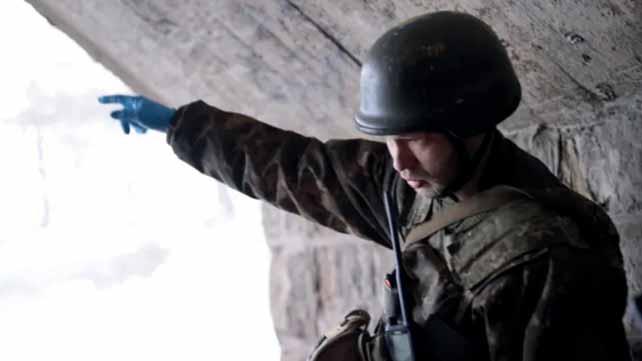
front,” Ukraine’s Ground Forces said in a statement.
“In the eastern direction of the front, the Russian occupiers do not stop their offensive attempts in the Lyman and Bakhmut directions,” the statement, translated by Google, noted. It added that Russian forces continue “to make attempts to break through our defenses” but suffer “heavy losses.”
“On the approaches to Bakhmut, our military showed great endurance and professionalism, which hindered the enemy’s actions and caused enormous losses in manpower for the Russian occupiers,” the statement continued, saying that, as a result, Russian forces had not been able to break through the defenses of the “Bakhmut fortress.”
Russian forces and mercenaries belonging to the private military company known as the Wagner Group have been attempting to capture Bakhmut for months. Capturing the city in Donetsk
is seen as a strategic goal for Russia as it tries to seize the region and wider Donbas area of eastern Ukraine.
NATO ARMS FOR UKRAINE BRING THE ALLIANCE INTO THE WAR, RUSSIA’S DEFENSE MINISTER SAYS
Russia’s defense minister said Western arms shipments to Ukraine have effectively brought NATO countries into the conflict.
“The USA and its allies are trying to prolong the conflict as much as possible,” Defense Minister Sergei Shoigu said on a conference call reported by Russia’s Ministry of Defense on Tuesday.
“With this purpose, they have started to deliver heavy offensive weapons, openly urging Ukraine to capture our territories,” he said, without providing evidence. Such steps, he added, bring NATO into the conflict “and can lead to an unpredictable level of escalation.”
NATO has offered Ukraine weapons to fight Russia, but has repeatedly insisted that they must be used in a defense capacity and not deployed against targets on Russian territory.
Shoigu said Russian forces were making progress in eastern Ukraine, listing a number of settlements that Russia has captured in recent weeks, including Soledar. He said Russian forces were making progress around Vuhledar and Bakhmut (called ‘Artemovsk’ by Russia).
Russia and Ukraine both claim that each others’ forces have suffered high death tolls in parts of eastern Ukraine. Analysts say that Russian forces have made incremental gains in Donetsk in eastern Ukraine in recent weeks.
UN SAYS MORE THAN 7,100 KILLED IN UKRAINE SINCE START OF WAR
The United Nations has confirmed at least 7,155 deaths and 11,662 injuries in
Ukraine since Russia invaded its exSoviet neighbor nearly a year ago.
The Office of the UN High Commissioner for Human Rights said the death toll in Ukraine is likely higher, because the armed conflict can delay fatality reports.
“Most of the civilian casualties recorded were caused by the use of explosive weapons with wide area effects, including shelling from heavy artillery, multiple launch rocket systems, missiles and air strikes,” the international organization wrote in a release.
UKRAINE’S PARLIAMENT APPOINTS NEW MINISTER OF INTERIOR FOLLOWING DEADLY HELICOPTER CRASH
Ukraine’s parliament appointed Ihor Klymenko as the country’s new Minister of the Interior after a deadly helicopter crash last month killed the previous minister as well as several other Ukrainian officials. Klymenko previously served as the acting interior minister on the heels of the helicopter accident, and before that as head of Ukraine’s National Police.
ZELENSKY SENDS AID AND RESCUE WORKERS TO TURKEY FOLLOWING DEVASTATING QUAKES
President of Ukraine Volodymyr Zelensky spoke with Turkish President Recep Tayyip Erdogan following Monday’s devastating twin earthquakes.
Zelensky told his Turkish counterpart that he will provide humanitarian aid to Turkey to help with the emergency situation in the country caused by the earthquakes. He also said that a group of Ukrainian rescuers and the necessary equipment will also be sent to help the people of Turkey.
“Ukrainian specialists have experience overcoming the consequences of natural disasters, and will arrive in the affected regions as soon as possible. They will help with the whole range of work on the recovery from the earthquake,” Zelensky told Erdogan, according to a Ukrainian readout of the call.
Devastating Earthquake in Turkey and Syria Claims more than 15,000 Lives
lic of Turkey received information about the death of Georgian citizen N.Z. in the city of Antakya as a result of the earthquake. The diplomatic representation of Georgia is in contact with the family members of the deceased, as well as with the relevant agencies of Turkey," reported the statement of the Ministry of Foreign Affairs.
Shortly after, the death of another citizen of Georgia was reported. “An eyewitness informed the embassy about the death of another citizen of Georgia - O.T., in Antakya, Turkey," the Foreign Ministry of Georgia noted.
“Search operations are continuing, and are not yet completed," said Georgian Ambassador to Turkey, Giorgi Janjghava.
been sent to Turkey to participate in the rescue operations, along with appropriate machinery.
60 firefighters, as well as rescue gear and machinery, were sent from the base of the Main Division of Emergency Response under the Emergency Situations Management Agency (ESMA) of the Ministry of Internal Affairs.
Firefighters and rescuers of the ESMA rescued a young woman from the ruins in the city of Adiyaman, after which she was transferred to a medical facility in a conscious state.
that responded to our call. I am in close contact with the Minister of Foreign Affairs. I know that Prime Minister Irakli Garibashvili is personally coordinating the relief effort. The Georgian people show great care. I would like to say that I am proud to be the ambassador in a country that loves Turkey so much.
COMPILED BY KETEVAN SKHIRTLADZE
Apowerful earthquake hit a wide area in south-eastern Turkey, near the Syrian border, on February 6, at dawn. The US Geological Survey said the 7.8 magnitude tremor struck at a depth of 17.9km near the city of Gaziantep.
Later, in the afternoon, the first earthquake was followed by another strong earthquake in the same area, this time of a magnitude of 7.5.
At time of going to print, the death toll as a result of the earthquake in Turkey and Syria stands at 15,383. At least 12,391 people died in the earthquake in Turkey, while in Syria, the number reached 2,992. Hundreds of buildings were destroyed, and thousands of people are still under the rubble.

A DEVASTATING EARTHQUAKE CLAIMED THE LIVES OF CITIZENS OF GEORGIA
Initially, the Ministry of Foreign Affairs of Georgia reported that two citizens of Georgia had died as a result of the earthquake in Turkey.
"The Embassy of Georgia in the Repub-
Later, the number of Georgian citizens who died as a result of the earthquake increased to three.
"Georgian woman, I. Ch died as a result of the earthquake in Adiyaman. The deceased has dual citizenship, and relevant procedures are being carried out by the family members," stated the statement of the Ministry of Foreign Affairs.
GEORGIAN RESCUE TEAMS HEAD TO TURKEY TO PARTICIPATE IN THE RESCUE OPERATIONS.
In accordance with the decision of the Prime Minister of Georgia, Irakli Garibashvili, Georgian rescue teams have
Georgian rescuers have been continuously involved in rescue operations throughout the night in the city of Adiyaman. A field camp has been set up at the site and Georgian fire rescuers are working in close coordination with the operational control center in the province.
An additional 40 firefighters from Georgia have since headed to the city to join the main group of rescuers.
The Turkish Ambassador to Georgia, Ali Kaan Orbai commended Georgia’s support. “The death toll is increasing, 62,000 people have been injured and more than 6,000 houses have been destroyed,” he said.
“We have mobilized all our resources in Turkey, and we have also received help from the international community. Georgia was among the first countries
"The Government of Georgia organizes material assistance. We are very proud to see that Georgian politicians, government officials, and the President were at the embassy to make a note in the condolence book. Along with material support, this also gives us emotional support from our close neighbor, our partner, our friend, our brother, our strategic partner - Georgia. The moment of silence during the session in the Parliament of Georgia was also very important for us and was a real expression of solidarity and friendship from the side of Georgia," the Ambassador noted.
A COUNTRY IN MOURNING
Turkish President Recep Tayyip Erdogan declared a state of emergency for three months in the 10 provinces affected by the devastating earthquake. He noted that Turkey faced one of the biggest natural disasters in the history of not only the country but also the region and the world as a whole. He also announced a week of mourning.
GEORGIA TODAY FEBRUARY 10 - 16, 2023 2 NEWS
A Ukrainian soldier in Bakhmut, Ukraine, on February 6. Source: Anadolu Agency | Getty Images
Photos source: www.news.sky.com
President: With Court's Decision, Georgian People Now Sentenced to Remain Hostages to the Situation
Continued from page 1
"The completely offensive question and doubts, for the largest part of our population, arose about us - whether Georgia will follow its declared orientation or return to Russia's orbit.
"The country's reputation was damaged, trust was shaken, our place in the new geopolitical context became uncertain. That in itself could be dangerous if Russia believes that we have lost the clear support of our traditional partners.
"This kind of discrediting is the result of the joint efforts of the ruling party and the opposition: On the one hand, the government's rhetoric, stubborn decisions and incomprehensible leniency towards Russia (excessive caution when mentioning Russia, persistent rhetoric of evasion of sanctions, or a positive assessment of the resumption of flights) which contrasts with a strict attitude and often offensive criticism towards Ukrainians and our partners. On the other hand, messages damaging the country's reputation by some representatives of Mikheil Saakashvili's family, which turned into a well-planned and implemented campaign (selective and unjustified equating with Putin's Russia and Navalny's imprisonment, mention of Auschwitz), were no less damaging, beyond the ‘humanitarian positioning.’
"No presidential pardon can help this mutual discreditation, because it is only an expression of the individual and per-
sonal will of the President, and not a sign of the new approach or real depolarization Europe demands from us. Considering the statements of the former president and as a result of his unrecognized and unrepentanted for crimes, it is expected that, in case of his release, he will become an active opponent, not only of the government, but of the coun-
try's reputation and therefore of its European chances.
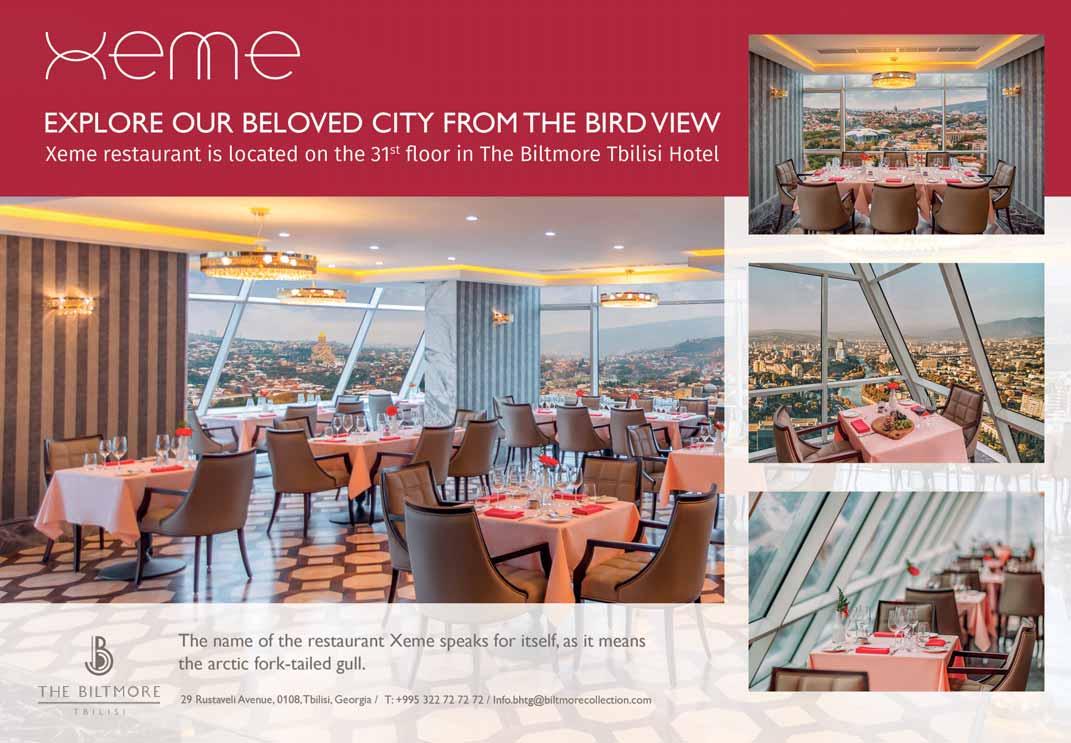
"The responsibility for plunging the country into this state is shared equally between those who convinced the former president to come back here, and those who let him in and refuse to let him out," reads the statement.
The President claims that authorities
have managed to practically remove the European path and the implementation of the 12 recommendations from the political agenda.
"Everyone should stop speculating and playing with the future of this country, take responsibility and stop damaging the face of the country. This issue should be removed from the Georgian
political space and this country should be given the opportunity to breathe, live, develop and receive the status of an honored candidate of the European Union! This is the will and order of the people of Georgia towards their government, and no-one has the right to do anything but fulfill this will!" the President noted.
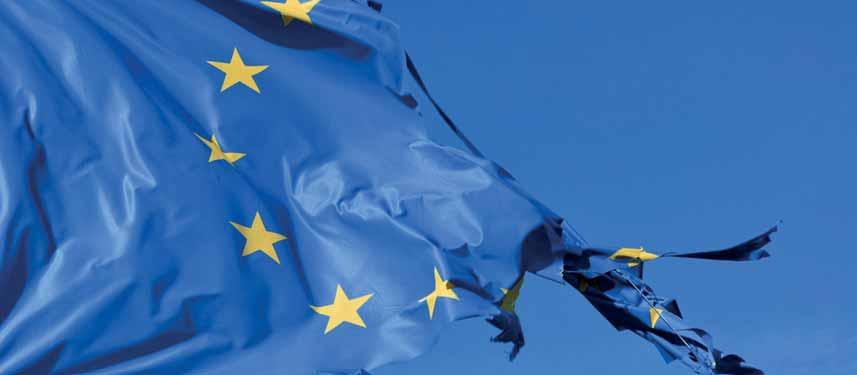
GEORGIA TODAY FEBRUARY 10 - 16, 2023 3 POLITICS
Oleksandra Matviichuk on Ukrainians Seeking Justice
We have to provide people effective protection from authoritarian regimes, and from wars. And we have to start with a very small but symbolic step: We have to exclude Russia from the UN Security Council.
AND HOW YOU PROPOSE TO MAKE THIS HAPPEN?
THE UN CHARTER DOES NOT PRESCRIBE THE EXPULSION OF A PERMANENT MEMBER FROM THE COUNCIL.
I have a very simple question: Who will provide justice for the hundreds of thousands of victims of this war who will not be lucky enough to be selected by the ICC? And the answer is the national system. But once again, 70,000 criminal proceedings is impossible to investigate even for the best national system in the world. And that's why we need to find a hybrid model: National investigators working together with international investigators; national judges working together with international, and so on.
INTERVIEW BY VAZHA TAVBERIDZE FOR RFE/RL
Oleksandra Matviychuk is the director of the Center for Civil Liberties, the Ukrainian NGO that shared the 2022 Nobel Peace Prize for its work documenting alleged Russian war crimes.

In a wide-ranging interview with RFE/RL Georgian Service, Matviychuk, a lawyer and human rights activist, said Russia's full-scale invasion of Ukraine was the result of decades of impunity for the Kremlin. She said Russian President Vladimir Putin and other high-ranking officials must ultimately be brought to justice, while acknowledging that the process is likely to be lengthy.
The interview with Matviychuk was conducted on January 26 in Strasbourg, France, on the sidelines of the winter session of the Parliamentary Assembly of the Council of Europe.
“The war changed our lives completely,” she tells us. “From the private perspective, every single aspect of what we call normal life was ruined. Now there is no safe place in Ukraine where you can be safe from Russian rockets. We live in total uncertainty- you can't plan your day, even next hours, because you never know when the siren will blare, or the electricity will cut off.
“From the professional point of view, I was documenting Russian war crimes for eight years before the large scale invasion started, but I wasn't prepared for this level of atrocities. I don't think you can be prepared for war. We're faced with enormous cruelty and an enormous amount of war crimes; we're faced with an enormous scope of human pain. We don’t just document violations of the Geneva Conventions; we document human suffering.
WHAT IS THIS MISSION TO DOCUMENT RUSSIAN WAR CRIMES LIKE TO CARRY OUT?
WHAT IS IT YOU AND YOUR TEAM HAVE TO GO THROUGH, DOING THE WORK YOU DO?
It's difficult. I'm a human rights lawyer, but first and foremost I'm a human being. And we now work with something inhuman. It's very difficult to get used to.
UKRAINE’S GENERAL PROSECUTOR GAVE YOU 71,000 ACCOUNTS OF WAR CRIMES. HOW DOES IT MAKE YOU FEEL TO KNOW THAT SOME WHO COMMITTED THOSE CRIMES MIGHT GO UNPUNISHED?
I can't predict the future, but I can do everything for the future I want to happen. It’s a huge responsibility. I’ve been documenting the stories of people who survived Russian captivity. Horrible stories. They tell me how they were beaten, raped; how their fingers were cut, how their nails were torn out, how they were tortured with electricity, all the horrible details, how they begged not to be beaten anymore, but to be killed so the torture would end. And I always ask them to apply to national investigators or to international organizations, and a lot of them say “no, we have no hope. We have no hope that our perpetrators in the occupied territories will be arrested, the international system is not capable,” etc. But they come to me, just a human rights defender, because they still have hope that justice is possible. They want their story recorded, not to vanish. I want their expectations to be achieved.
IS THERE A STORY YOU WISH YOU’D NEVER HEARD, THAT YOU'D LIKE ERASED FROM YOUR MIND?
When your perception of what is normal is ruined, you see the things you thought were essential are not essential at all. There are only a few things that are really important in life, values for which you can live, fight and even die for. And I told myself: In future, I want to forget a lot of things which I’ve heard and felt during this war, I don't want to carry this war inside me for the rest of my life. But I do want me to remember those essentials. It’s a very important lesson learned.
I never want any nation to go through this experience, but these dramatic times have given us Ukrainians a chance to express our best features, to fight for freedom, to be courageous, to make tough but correct choices, and to help each other. When the invasion started, international organizations evacuated their staff, but ordinary people remained. They started to risk their lives to defend and help others who they’d never met before. Now, like never before, we are acutely
aware of what it means to be human beings.
DO YOU SEE ANY SIMILARITIES BETWEEN RUSSIAN MILITARY STRATEGIES USED IN UKRAINE AND ONES THEY USED ELSEWHERE?
All that we face in Ukraine is a result of the total impunity Russia enjoyed for decades. Russian troops committed horrible atrocities in Chechnya, in Georgia, in Moldova, in Mali, in Libya, in Syria, elsewhere. They have never been punished. This brutality, cruelty, and this ignorance of international law and basic human rights; this rejection of human dignity, have become a part of Russian culture. One example: When the invasion started, we got a message from my colleague from Syria, and they said, “please tell your authorities they should never mark medical workers as medical workers or hospitals as hospitals, or evacuation cars with the label children, because the Russians will deliberately hit them.” It happened: A Russian pilot dropped a bomb on the Mariupol Drama Theater, where in big letters “children” was written. Russia destroyed that drama theater.
OVER THE PAST 8 YEARS
YOU SENT DOZENS OF REPORTS TO THE UN, OSCE, COUNCIL OF EUROPE, AND EUROPEAN PARLIAMENT, BUT THEY DIDN'T LISTEN. NOW THEY ARE LISTENING. WHAT ACTION SHOULD FOLLOW?
Even when you are heard, international systems may not be capable of doing anything. It's an illusion that an international system of peace and security exists. It doesn’t. The whole UN system couldn't stop the Russian atrocities. When the UN Sec Gen came to meet President Zelensky, a Russian rocket hit his residential building and killed a journalist from Radio Liberty. It's a very dangerous world to live in, because it means that our security, our human rights guarantee, depends not on international order and international law, but only on whether or not you live in a country with strong military potential. It’s a very dangerous logic. We need to restore international order, to start a cardinal reform of this international system of peace and security in order to provide human rights guarantees and security for everyone, regardless of the country they live in.
We need to call for historical responsibility from the political leadership of these countries. Yes, they have different goals and there are governments which do not represent their people. But I look to the future with optimism, because, in my experience, I know that if you can't rely upon a legal instrument, you can always rely upon people. Systematic strategic changes have been based on the involvement of ordinary people. During the Revolution of Dignity, when they coordinated civil initiative Euromaidan SOS, we provided assistance to prosecuted protesters throughout the country 24/7. And then we established an international network, and launched a global action to release political prisoner Oleg Sentsov and other Ukrainian political prisoners which were jailed by Russia, and then we united people in 35 countries, hundreds and hundreds of people all over the world who joined the global campaign. Justice is a very understandable value for millions of people around the globe, and in this regard, there are no national borders. Right now, there is not just a war between two states, it's a war between two systems: Authoritarianism and democracy.
Last century, it was naive to think that an international organization could interfere with the internal state affairs of a sovereign state when that state violates human rights. Now, it’s the basic principle of international law. I'm a human rights lawyer and I know this legal system is not conservative: It can be developed, adapted to the appropriate needs. The main barrier is our minds.
Some say “justice is important, but we need peace, stability.” But we will never have peace in our region without justice, which means stable peace, not just a temporal political compromise which provides Russia the chance to regroup and then go further. We need a sustainable, stable peace which provides people the opportunity to live without fear of violence, and have a long perspective.
Peace won’t be sustainable without justice, because in our region, Russia has been using war as a tool to achieve its geopolitical interests for decades. Russia has been using war crimes as a way to win their wars for decades. It will not break the circle of impunity; we'll have another war, maybe not against the Ukrainian nation, but against another nation, and I want to prevent it.
YOU ALSO SAY THAT WE SHOULD NOT WAIT TO BRING VLADIMIR PUTIN TO JUSTICE. HOW DO YOU PROPOSE THAT SHOULD BE DONE?
We have to establish a special tribunal on aggression to hold Putin, Lukashenko and other top military command and senior political leadership of the Russian Federation accountable. Even that is not enough, because when we speak about the crime of oppression, it's only one type of international crime. We have war crimes, crimes against humanity, genocide. And when the International Criminal Court is limited to investigation only, to several select cases or war crimes, crimes against humanity and genocide,
YOU COULD PROBABLY GET THOUSANDS OF PEOPLE WORLDWIDE TO HOLD RALLIES AND DEMAND THAT PUTIN BE BROUGHT TO JUSTICE.
HOW CLOSE WOULD THAT BRING US TO ACTUALLY BRINGING PUTIN TO JUSTICE?
When we did the Save Sentsov campaign, it wasn’t just protesting with abstract demands to Putin: We made a strategy. And people in 35 countries in the world, on one day, appeared in their central squares with the demand to their own national governments. We wrote what their national government had to do in order to push Russia to release the Ukrainian political prisoners. And people demanded it. This is the combination we need: The energy of the people and a strategy to push this energy in the right way. We need to be precise with our goals. We have to try.
WHEN YOU RECEIVED THE NOBEL PRIZE, DID ANYTHING CHANGE IN TERMS OF THE IMPACT OF YOUR ORGANIZATION?
Yes. For decades, the voices of human rights defenders weren't heard. We were invisible at the international level, at the national level. It was like a blind spot. The Nobel Peace Prize gave us an opportunity to make our voice tangible, and once again put on the table in the rooms where political decisions are made, that human rights and peace are inevitably linked, and we will have no peace without justice.
YOU SAID: “THE MAJORITY OF THE RUSSIAN PUBLIC HAS SUPPORTED THE WAR. PUTIN IS MERELY SEEKING TO SATISFY THE PUBLIC'S DESIRE FOR RESTORATION OF THE RUSSIAN EMPIRE.” DOES THAT MEAN THE LINK BETWEEN RUSSIANS AND UKRAINIANS, AS PEOPLES, IS FINALLY AND IRREVERSIBLY SEVERED?
Recently, a study was done by a Ukrainian psychotherapist. Several focus groups were created and she asked people from whom they are waiting to be asked for forgiveness on the Russian side: From Putin, from the Russian government, from parliament, from the Russian intellectual elites, or from ordinary Russian people. In first place was the answer: From nobody. This means that Ukrainians want justice, they don’t want to be asked to forgive. We’re not waiting for “forgive us” from Russian people; we need justice done, and once it is, then they, as a result, can ask for forgiveness. The concept of forgiveness means you’re ready to forget what happened. Ukrainians are not going to forget. We need justice.
ARE THEY GOING TO FORGIVE?
It’s possible, but only as a result of justice. You can forgive when you feel satisfied. And this is essential, because if the demand for justice isn’t responded to, it can turn into a demand for revenge.
GEORGIA TODAY FEBRUARY 10 - 16, 2023 4 POLITICS
A Difficult Year for Georgia’s Occupied Regions
ANALYSIS BY EMIL AVDALIANI
For Georgia’s occupied territories of Abkhazia and South Ossetia, 2023 will be a difficult year both economucally and politically. This will serve as a further restraining factor on the separatist regions’ ambitions to gain independence worldwide.
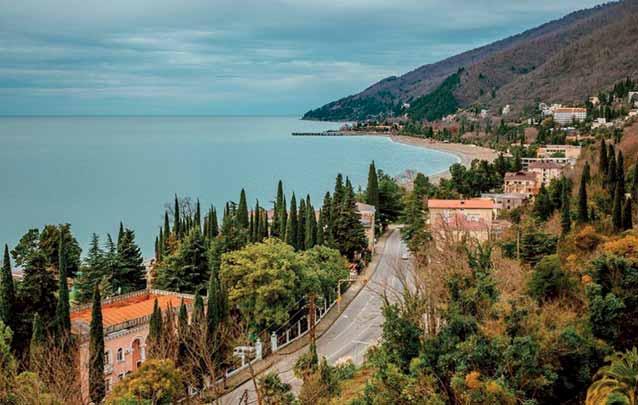
The two regions’ problems begin where their hopes for independence lie: in Russia. The latter invaded Ukraine in February 2022 and instead of quickly imposing a new order, rather undermined its position both economically and politically. It failed to take Kyiv and instead of further weakening the collective West, has helped to strengthen it. Never since the end of the Cold War period has the West been so united when it comes to dealing with/containing Russia.
This has major repercussions for the separatist entities along Russia’s borders, and especially for the Abkhazia and Tskhinvali regions. The first negative trend is Moscow’s decision to recognize the Luhansk amd Donetsk separatist regimes and then annex them along with other two Ukrainian territories. On the surface, Abkhazia and the Tskhinvali should have been happy with what Russia did, but as the war turned into a protracted conflict, Russian weaknesses multiplied.
More importantly, the Kremlin’s decision exposed Russia’s approach to separatist entities – Moscow has not been interested in the defense of breakaway territories, but was rather using them for its own geopolitical agenda. The arguments, believed by many in the West, that the Russian invasion of Georgia in 2008 and Ukraine in 2014 were (at least partially) motivated by fears of Russian speakers being oppressed turned out to be false. Moreover, claims that NATO was an instigator of the rivalry with Russia by drawing Georgia and Ukraine into the alliance likewise proved
inaccurate at best.
As of February 2022, there are simply too many separatist entities supported by Russia. This lessens the chances for Abkhazia and South Ossetia to gain wider acceptance in the world or even the region. Few, if any, especially amid the Western condemnation of Russia, would go for recognizing Abkhazia and South Ossetia, or the four regions of Ukraine, as part of Russia.
Some plans could materialize, but they will nevertheless remain short of what is often hoped for. For example, there is some approximation taking place between Abkhazia and Belarus. The latter’s president visited the region in 2022, while in January 2023 it was reported that Sokhumi’s commercial representation would be opening in Minsk.
Yet, the biggest problem for Georgia’s occupied territories is the economic situation. Russia is subject to incremental economic and financial sanctions.
With Abkhazia and Tskhinvali economically fully dependent on their security patron, the expected difficulties in Russia will have a spillover effect on the two territories.
This, however, does not mean that Russia will not be working toward achieving its goals. The agreement on handing over the Bichvinta resort to Russia will likely be ratified, despite all the confusion and outright negative reaction from within Abkhazia. With the continuing war in Ukraine, Moscow will also push for a steady flow of volunteers from the two regions, where the war has become extremely unpopular.
THE SEPARATIST REGIONS AND TBILISI
Though it is difficult to say what the two separatist regions’ relations with Tbilisi will look like as the geopolitical situation in the region is highly fluid, nevertheless several major trends could be perceived. First is the emerging understanding between Moscow and Tbilisi.
At a time when Russia is preoccupied with its war in Ukraine, it highly values Georgia’s non-committal approach to Western sanctions. Anti-Russian rhetoric, too, is rather low among the Georgian politicians, which for the Kremlin is a highly positive development. Russia, from its side, is being careful not to push hard on Tbilisi when it comes to Abkhazia and South Ossetia.
This tentative mutual understanding could be a critical development for the two regions, who fear that rapprochement between Moscow and Tbilisi might be detrimental to their interests, as Russia needs Georgia’s neutral position. And since the war will likely continue for the foreseeable future, Tbilisi and Moscow might further enhance bilateral understanding.
The fate of the two separatist regions
is closely linked to Russia. This is seen as a boon in terms of security, but also as a huge liability when it comes to the economic stability of Abkhazia and South Ossetia. Ramifications will be wideranging. Corruption and ever decrepit infrastructure will hamper the two territories’ development. In a way, for Tbilisi, it is an opportunity. In the longer run, some kind of talks could be entertained with Sokhumi. Contingent upon Georgia’s internal economic development, Tbilisi could become more attractive for ordinary Abkhaz and Ossetians. Some experience in that regard is already there. Before 2020, and especially following the pandemic, Georgian medical services attracted numerous residents from the two territories. Similarly, the education sector, with wide ranging
state-sponsored incentives, has also attracted a large pool of future students. Moreover, looking at the South Caucasus from a wider regional perspective, the situation is likewise not attractive for the Abkhazia and Tskhinvali regions. The collective West has hardened its stance on separatist entities. More importantly, however, the EU and NATO now see the importance of the Black Sea and the South Caucasus, signaling that Georgia would have a bigger role for the West. This means potential membership in the EU and a highly intensive cooperation with NATO, trends which are unfavorable for Sokhumi and Tskhinvali.
Emil Avdaliani is a professor at European University and the Director of Middle East Studies at the Georgian think-tank, Geocase.
MP Sir Edward Leigh: If Mrs. Thatcher was still alive, she’d be strongly in favor of helping Ukraine
Council of Europe. We wanted to pick his brain on his current views towards those Ukrainian refugees, and the UK’s assistance in the war against Russia.
SIR EDWARD, YOU IDENTIFY AS A THATCHERITE. WHAT DO YOU THINK PM MARGARET THATCHER’S COURSE OF ACTION WOULD BE WITH REGARDS TO THE UKRAINE WAR? WOULD IT BE DIFFERENT TO THE CURRENT GOVERNMENT POLICY?
I am in absolutely no doubt that if Mrs. Thatcher was still alive, she’d be strongly in favor of helping Ukraine. She was very strongly against aggression. PM Thatcher, better than most, knew what the Cold War was about. She fought against the Soviet Union. And she’d have done the same today, because let’s face it, what Putin is doing now is re-establishing the Soviet Empire.
I am not a military expert, but I’m glad we provided those heavy tanks. There will probably be more, and I’m glad we set an example to the Germans and Americans.
YOU WERE STRONGLY AGAINST THE 2003 IRAQ INVASION. TODAY, IRAQ IS A STICK WITH WHICH TO BEAT THE WEST WHEN IT CRITICIZES PUTIN’S ACTIONS IN UKRAINE. WHAT DO YOU THINK OF THESE COMPARISONS?
Sir Edward Leigh is a British Conservative Party politician who has served as a Member of Parliament since 1983. Leigh was knighted in the Queen's 2013 Birthday Honors for "public and political service," and has also received honors from the French and Italian governments, however, Leigh has a reputation at Westminster for his independence of mind as a “serial rebeller,” always
ready to air his views. An example of that was seen last spring when he appeared to praise Priti Patel, the Home Secretary, when she announced that the government was further relaxing the immigration rules to allow more relatives of Ukrainians in the UK to join their family members, but stopped short of entirely waiving the existing rules for those trying to escape the Russian bombardment in Ukraine. Leigh said: “Everybody wants to be humanitarian and she’s under pressure to have a visafree scheme like the rest of Europe, but may I actually congratulate her on her proportionate response.
I think we have to remember that, unlike the rest of Europe, we have uniquely liberal labor laws and we speak English, so we are the country of choice for mass immigration, and therefore I do urge her to, as well as listen to all the humanitarian voices, to listen to the voices of people in Lincolnshire [UK region], who feel we’ve done our bit in terms of migration from Eastern Europe. We’re under extreme pressure in terms of housing and jobs.”
Radio Free Europe’s Georgian Service met with Leigh on January 26 in Strasbourg, France, on the sidelines of the winter session of the Parliamentary Assembly of the
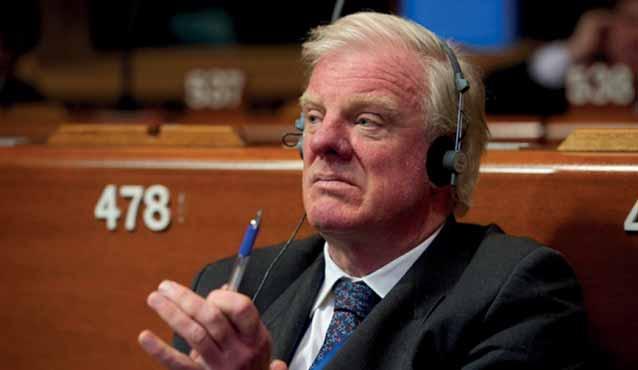
YOU WERE CRITICIZED FOR YOUR REMARKS ABOUT UKRAINIAN IMMIGRANTS AT THE BEGINNING OF THE INVASION. DO YOU THINK THE UK HAS DONE ITS BIT WHEN IT COMES TO SUPPORTING UKRAINE, IN PARTICULAR THE REFUGEE ISSUE?
My comments on the refugee issue were misinterpreted. I am in support of helping Ukrainian refugees, and my office has been hard at work for that cause. The problem here is the home office, with all its bureaucracy.
THE CHALLENGER 2 TANKS – SHOULD THE MOVE BE FOLLOWED BY MORE?
I don’t think there can be any comparison at all. I was opposed to Iraq and Blair, but what we did was thought to be a deterrence, because it was thought Iraq had weapons of mass destruction. Whereas Blair acted out of goodwill, Putin acts out of malice. Also, Iraq, as you might remember, was a British colony before World War 2, but it was never Blair’s intention to reinstate that, unlike what Putin is doing. So I think any comparison is baseless.
AS AN ARDENT CATHOLIC, HOW DO YOU FEEL ABOUT RUSSIA USING ORTHODOX FAITH AND THE CHURCH AS A WEAPON IN ITS WAR AGAINST UKRAINE?
There is a tradition, we know, in Russia, for the Russian Orthodox Church to be very close to the state. And Putin is using it, rather like Stalin did. But it’s a misuse of religion. And it’s quite wrong for the Patriarch and all the rest of them to allow themselves to be used by Putin to justify a war of aggression. They are Christians, and my personal view is that Christian bishops, patriarchs, metropolitans should stick to talking about Christ, not about war.
GEORGIA TODAY FEBRUARY 10 - 16, 2023 5 POLITICS
MP Sir Edward Leigh
INTERVIEW BY VAZHA TAVBERIDZE FOR RFE
Innovative Science, Environmental Protection, Safety
tainability and risk management, testing and implementing the Critical Assets and Portfolio Risks Analysis (CAPRA) model, which provides a quantitative assessment of all the expected risks.
We had a memorandum of cooperation with the University of Maryland (USA), the scientific consultant of the project was Professor Bilal M. Ayyub, and I was the scientific supervisor of the grant project.
For the first time in our country, in 2018, the Shota Rustaveli National Science Foundation of Georgia announced a competition for grant projects with an invasive application, which envisioned the creation of scientific consortia with the involvement of non-governmental organizations.
We created a consortium that was made up of the Tsotne Mirtskhulava Water Management Institute as the leading organization, the organization in Category of Consultative Status with the Economics and Social Council (ECOSOC) of UN as a consultative status organization, the NNLE, “Environmental Protection Ecocenter,” and the Ltd Geological Environmental Agency. Our consortium won and was funded by the grant project AR-18-1244 - "Debris flow regulation elastic barrage" (Georgia Patent # P 20207068B).
implementation of scientific grant projects and training programs on drying wetland soils. GTU doctoral student Maka Guguchia successfully defended her doctoral dissertation using the abovementioned stand.
WHAT CAN YOU TELL US ABOUT INNOVATIVE TECHNOLOGIES?
mashvili and Kote Iordanishvili, we published an explanatory dictionary of hydroengineering terminology for the first time in our country ("Universal" publishing house, Tbilisi, 2022, format A4, 371 p.). The work is dedicated to the 100th anniversary of GTU.
TRANSLATED BY KETEVAN SKHIRTLADZE
Of late, climate change has resulted in a plethora of natural disasters in Georgia, especially the catchment basins of the Aragvi, Alazni, Enguri, and Rioni rivers, where natural disasters bring great destruction and economic losses, as well as human casualties. To discuss these issues, GEORGIA TODAY sat down with Givi Gavardashvili, an academician of the Georgian National Academy of Science and an engineer-hydraulic technician, who has been working on perfecting the scientific aspects of environmental safety for almost half a century.
PLEASE INTRODUCE OUR READERS TO YOUR AND THE INSTITUTE'S SCIENTIFIC WORK.
“I work in one of the oldest scientific and research organizations in the South Caucasus, founded in 1929, as the director of the Tsotne Mirtskhulava Water Management Institute of the Georgian Technical University, which will celebrate its 95th anniversary in 2024. Under my leadership, the institute cooperates with universities and scientific-research institutes of 33 countries of the world,” he notes, by way of introduction.
“We are working on the strategic direction of the integrated management of water and soil resources for Georgia, with research into innovative water management and environmental protection measures, taking into account cli-

mate change. Alongside this, we’re looking into how to improve the scientific issues of hydromelioration using modern techniques and technologies. The most important priority for our country, however, is the education of young scientific personnel,” he says.
WHAT CAN YOU TELL US ABOUT YOUR INSTITUTION?
Our institute is one of the oldest scientific-research organizations, one in which world-class scientists such as academicians Tsotne Mirtskhulava and Otar Natishvili, both of whom were my teachers, and professors Mikheil Gagoshidze, Fridon Shatberashvili, Aleksandre Didebulidze - one of the Technical University’s founders, Ioseb Buachidze - former rector of the Technical University, Petre Mamradze (senior), Vakhtang Tevzadze, and Nino Varazashvili. It can be said that our institute is the oldest scientificresearch organization in the South Caucasus region working in hydrotechnical structures and melioration directionsalma mater.
TELL US ABOUT YOUR INNOVATIVE PROJECTS IN THE DIRECTION OF ENVIRONMENTAL PROTECTION.
In 2018-2022, the institute worked on grant project # FR17_615, a security risk assessment of vulnerable infrastructure during the formation of expected disasters, sponsored by the Shota Rustaveli National Science Foundation of Georgia. In the project, safety issues for the population, including a possible incident at the Zhinvali Earth Dam, were processed. We established a framework for sus-
Professor Eduard Kukhalashvili is the scientific head of the project, and I worked as the coordinator. Within the framework of the grant project, among other tasks, the preparation of doctoral theses and the arrangement of innovative construction in nature were envisioned. These tasks were successfully carried out. On February 22-23, 2022, at the Faculty of Construction of GTU, employees of the institute Keti Dadiani, Khatuna Kiknadze, Nana Beraya and Lika Maisaya successfully defended their doctoral theses and were awarded the academic degree of Doctor in Construction. The preparation and public defense of these four doctoral theses within one grant project was the first of its kind in Georgia.
The "Debris flow elastic barrage" in nature was implemented in the MtskhetaMtianeti region, Dusheti municipality, near the village of Kvemo Mleti, in the bed of the Mleti River Gorge (1620 meters above sea level), which will not only reduce the destructive effect of flooding in the villages of Zemo and Kvemo Mleti but will also minimize the risks of flooding of the St. George Church in Mleti.
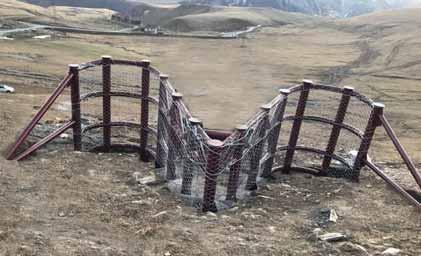
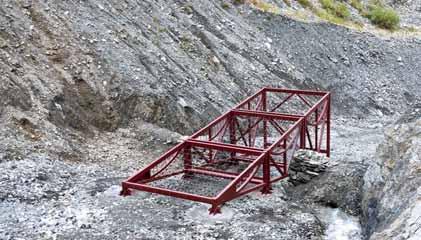
I’d like to express my gratitude to Mtskheta-Mtianeti Region Governor David Nozadze and Dusheti Municipality Mayor Manana (Matsatso) Narimanidze, and the local residents of Kvemo Mleti village, without whose consent and support the test-experimental structure of the “Debris flow elastic barrage” could not have been built.
The next innovative project that we implemented in 2021-2022 was supported by the Shota Rustaveli National Science Foundation of Georgia and funded by the World Bank (WB) grant project CARYS-19-305 – an innovative complex anti-snow avalanche measure (Patent of Georgia # 278). The project could not have been implemented without Davit Nozadze and the mayor of Kazbegi municipality, Bakur Avsajanishvili. In order to protect the Georgian Military Highway from the effects of snow avalanches, we built an innovative anti-snow avalanche construction in the alpine zone of the mountain slope in the vicinity of Gudauri, 2338 m above sea level.
TELL US ABOUT A HYDROMELIORATION
PROJECT YOU HAVE RUN.
In Didi Jikhaishi, Samtredia, at the agricultural college of GTU, we organized a scientific and educational stand of three-tiered combined drainage for the
On August 24, 2022, a scientific seminar was held at the Tsotne Mirtskhulava Water Management Institute of the Georgian Technical University on the topic: "use of innovative technologies - concrete canvas in water management, environmental protection, and hydromelioration." The presentation was made by Ildar Yamaliev, Director of Concrete Canvas Company, and Ian Woodcock, Co-Founder of Concrete Canvas Company, England. After the scientific seminar, an example of the practical use of concrete canvas was held in the hydrotechnical laboratory of the institute.
WHAT MODERN SCIENTIFIC LITERATURE HAVE YOU BEEN INVOLVED IN CREATING?
We actively cooperate with such worldfamous publications as Lambert in Germany and "Cambridge Scholars Publishing" in England. In 2019-2021, Lambert published a monograph with the coauthorship of Eduard Kukhalashvili, Shorena Kupreishvili, and Nana Beraya named "Expected Risks of Cohesive Debris Flows and Fighting Against Them" in eight foreign languages (English, Spanish, Dutch, Italian, French, German, Polish and Portuguese). In 2022, Cambridge Scholars Publishing published my monograph "Predicting Erosive and Debris Flow Processes and the Innovative Measures to Control Them" in English, which is currently on sale on Amazon. [https:// www.cambridgescholars.com/ product/978-1-5275-84822?fbclid=IwAR2b596YKJsbj-JZ_LBHwjIJCS1md8U3ecXBRwYS-88T1lxVpw5xwHqEZMA].
Co-authored with the scientists of the institute, Irine Iordanishvili, Inga Ire-
Co-authored with the Rector of GTU, Professor Davit Gurgenidze, in 2022, the publishing house Technical University published a monograph "Basics of ecological-economic theory of integrated management of natural resources" Tbilisi, 2022, 230 pages, which can be used as a desk guide for students and young scientists. The monograph is also dedicated to the 100th anniversary of GTU.
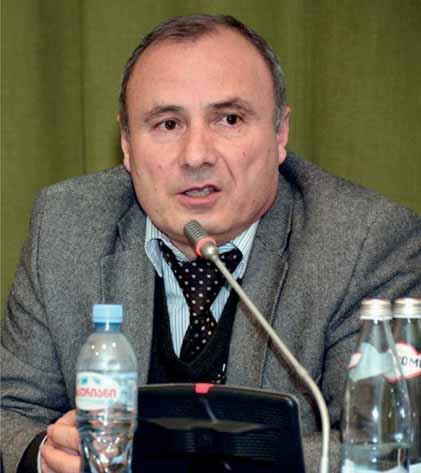
WHAT CAN YOU TELL US ABOUT THE FUTURE OF THE INSTITUTE'S WORK AND THE 2023 PLAN?
The institute, together with universities in the USA, Georgia, Ukraine, Bulgaria, Romania and Turkey, prepared a NATO grant project. The project directory is the California State University and we are waiting for information about project funding. The project concerns the ecological safety of the Black Sea and developing digital models against cyberattacks. We also developed a project on innovative methods of risk assessment of natural disasters and submitted it to the United Nations. We expect a response from New York this spring.
The scientific and research work at the institute has already moved to the level of Euro standards, a fact ensured by the constant updating of material and equipment at the institute. We have purchased drones, high-precision GPS, and installed mini-meteorological stations of international standard at our two research scientific bases in Poti and Karaleti village near Gori, from which meteorological data in Tbilisi is updated online every hour. Large-scale modeling of sea waves is also actively underway in the institute's hydrotechnical laboratory, which is led by Irine Iordanishvili, Doctor of Technical Sciences, Head of the Seas and Reservoirs Research Department.
GEORGIA TODAY FEBRUARY 10 - 16, 2023 6 BUSINESS
Debris flow elastic barrage in the bed of the Mleti river gorge (October 8, 2022)During the construction of three-tiered combined drainage
Innovative construction anti-snow avalanches (2021)
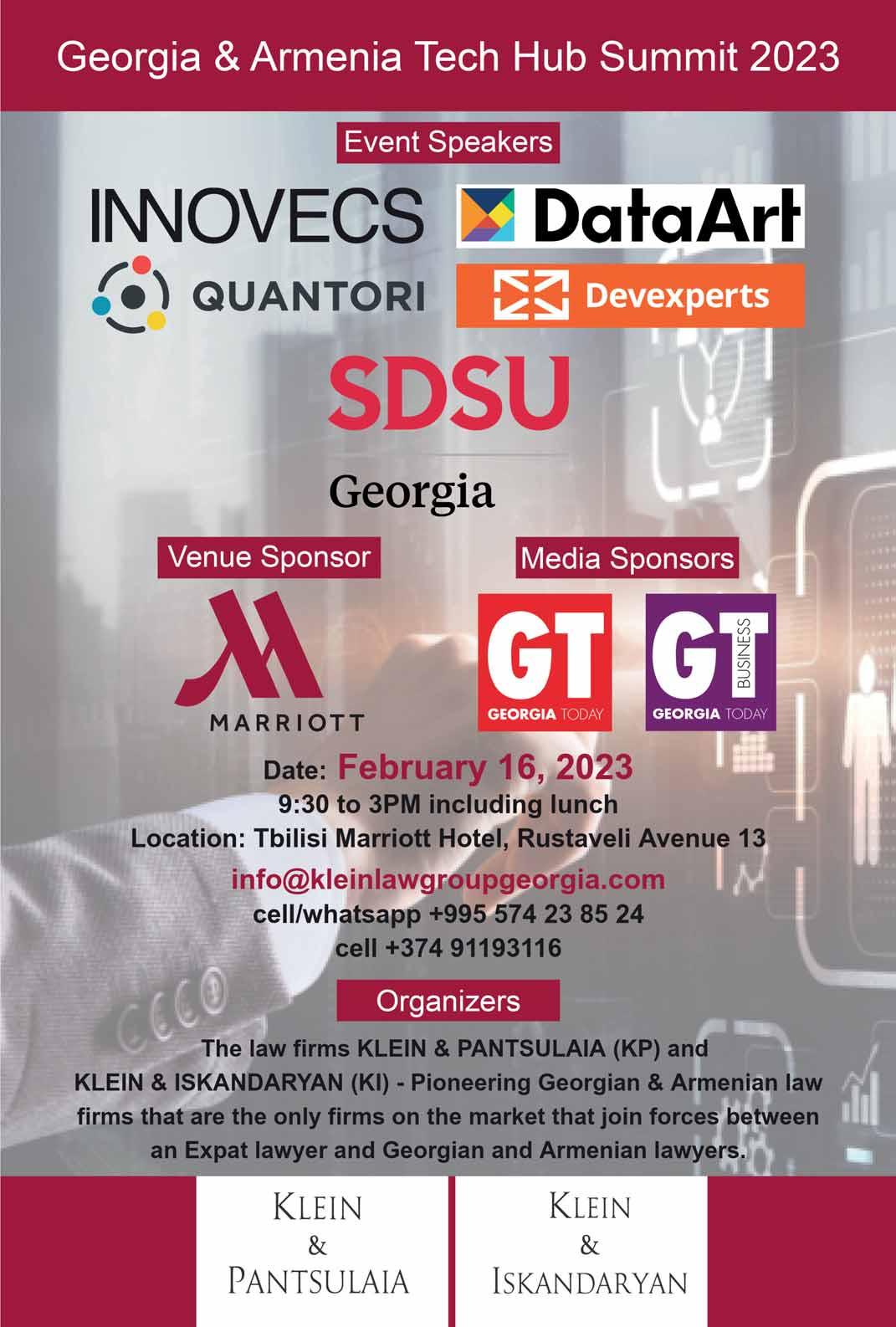
The number of international travelers increased by 216.9% in December 2022, compared to the same period of 2021, and declined by 15.4% compared to the same period in 2019. Meanwhile, the number of international visitors increased by 213.9% (2022/2021) and declined by 5.6% (2022/2019), and the number of international tourists increased by 110.7% (2022/2021) and declined by 2.4% (2022/2019).
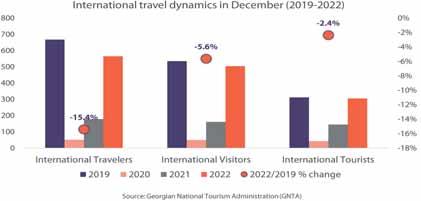
In December 2022, the top countries of origin of international visits were Turkey (199,124 visits), Russia (89,513 visits), and Armenia (76,181 visits). Throughout 2022, among the major tourism markets, the number of international visits from Belarus (96.5%), Saudi Arabia (59.6%), and Kazakhstan (16.3%), significantly exceeded the pre-pandemic figure (2019). Further, the number of international visits from neighboring countries: Turkey (-20%). Russia (-26.1%), Armenia (-45.6%), and Azerbaijan (-90%) remained well below the pre-pandemic number. The low recovery rate of visits
from Azerbaijan could be attributed to the closure of the land border between Georgia and Azerbaijan since March 2020.
TURNOVER IN ACCOMMODATION SECTOR
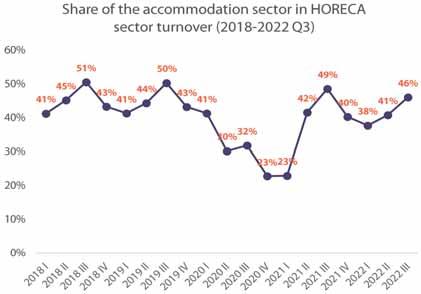
The accommodation sector recovered significantly in Q3 of 2022, with turnover showing a 20.1% increase compared to Q3 of 2019. Moreover, the turnover of the accommodation sector hit an all-time high of GEL 794.9 mln in Q3 of 2022, which could be attributed to the increased average length of stay for both international and domestic visitors, general inflationary trends, and the market distortions caused by mass migration after the outbreak of the Russia-Ukraine war. Turnover in the accommodation sector increased markedly in the first three
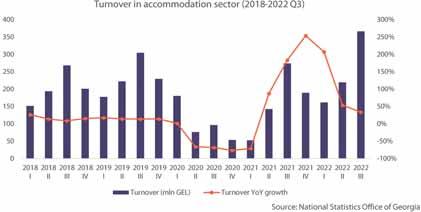
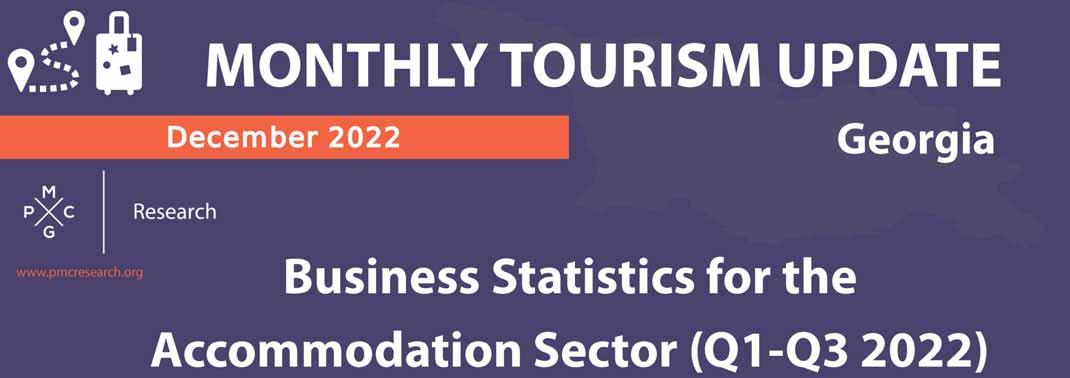
was 207.5% higher compared to Q1 of 2021, while in Q2 and Q3 of 2022, the YoY growth rates were 54% and 33.6% respectively, compared to the corresponding periods of 2021.
After a steep decline in the share of the accommodation sector in the total turnover of the HORECA sector throughout the pandemic, in the first three quarters of 2022 the quarterly shares of the accommodation sector almost returned to pre-pandemic levels, reaching 46% in Q3 of 2022, yet still behind the contribution of the food service sector to the total turnover of the HORECA sector.
EMPLOYMENT AND SALARIES IN ACCOMMODATION SECTOR
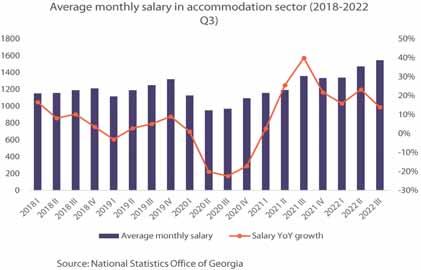
In the first three quarters of 2022, employment in the accommodation sector demonstrated a considerable recovery and increase compared to 2021. Notably, in Q3 of 2022, average employment was only 7% lower compared to Q3 of 2019. Meanwhile, the YoY growth rate of employment slowed down over the course of the first three quarters of 2022, with a 9% YoY increase in Q3 of 2022. By the end of that quarter, average employment was 15,000 employees.

The average monthly salary in the accommodation sector showed a gradual increase after the sharp decline experienced initially at the beginning of the pandemic. Notably, in the first three quarters of 2022, the average monthly salary in the accommodation sector exceeded the pre-pandemic (2019) values significantly, with an average increase of 22.5%.
Total salaries also demonstrated a significant increase, reaching a total of GEL 23.2 million in Q3 of 2022, which is 24.2% higher compared to Q3 of 2021 and a 14.8% increase compared to the prepandemic figure (Q3 of 2019).
HOTEL PRICE INDEX IN GEORGIA
quarters of 2022 compared to the previous year. After staggering YoY growth early in the year for turnover in the accommodation sector, it slowed down in the second and third quarters. Due to the low base effect, in Q1 of 2022, the turnover of the accommodation sector
In December 2022, in Georgia the hotel price index increased by 5.0% compared to November 2022. The 3-star, 4-star, and 5-star hotel price index increased by 7.9%, while for guesthouses, the price index increased by 5.4%. The monthly HPI was the highest in Mtskheta-Mtianeti (25.2%) and the lowest in Samegrelo-Zemo Svaneti (-14.9%).
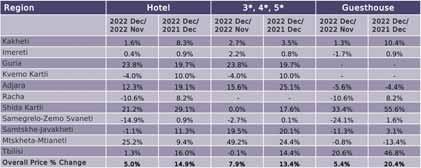
In December 2022, compared to December 2021, hotel prices in Georgia increased by 14.9%. The prices of 3*, 4*, 5* hotels increased by 13.4% and the prices of guesthouses increased by 20.4%. The yearly HPI was the highest in Shida Kartli (29.1%) and the lowest in Imereti (0.9%) and Samegrelo-Zemo Svaneti (0.9%).
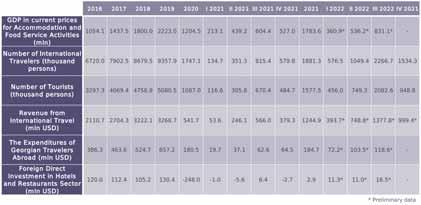
THE AVERAGE HOTEL PRICES IN GEORGIA
In Georgia, the average cost of a room in a 3-star hotel was 167 GEL per night in December 2022, while the average cost of a room in a 4-star hotel in Georgia was 275 GEL per night and the average cost of a room in a guesthouse was 122 GEL per night.
The average cost of a room in a 5-star hotel in Georgia in December 2022 was 456 GEL per night. In Tbilisi, the average price was 559 GEL, followed by Kakheti – 552, Samtskhe-Javakheti – 458, and Adjara – 429.
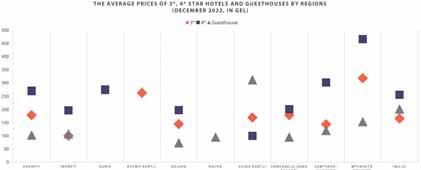
GEORGIA TODAY FEBRUARY 10 - 16, 2023 8 BUSINESS
EU and UNDP Support Urban Renewal, Tourism and Education in 6 Municipalities
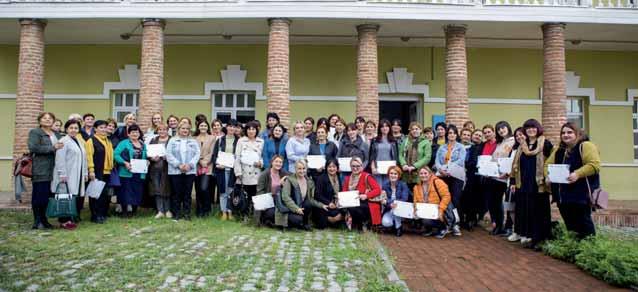
serving as a venue for educational activities, film screenings and youth meetings.
4. Telavi Municipality (Kakheti region): 96 staff in 32 kindergartens will be trained and certified in first aid services. Two kindergartens will receive additional support to equip doctors’ offices at their premises. All participant kindergartens will be able to meet the legal requirements needed to receive authorization in child health protection and accident prevention.
5. Oni Municipality (Racha-LechkhumiKvemo Svaneti region): An Open Air Cinema at one of Oni’s newly renovated plazas will provide young people with a comfortable and inspiring space for film screenings, educational work and discussion club activities.
6. Tsageri Municipality (RachaLechkhumi-Kvemo Svaneti region): The project will support the digital transfor-
mation of a municipal preschool education system. E-documents will replace the outdated paper versions that are still in use throughout the municipality. Electronic tools will be introduced for registering children with kindergartens and training teachers.
With EUR 2 million in funding from the European Union, UNDP implements a four-year EU4ITD program to advance effective, responsive and accountable national and sub-national governance in four regions of Georgia: Guria, Imereti, Kakheti and Racha-Lechkhumi/Kvemo Svaneti. The project promotes decentralization, inclusive and evidence-based policymaking, citizen engagement and better service delivery at the local level. It contributes to the implementation of the Pilot Integrated Regional Development Program (PIRDP) and Georgia’s Decentralization Strategy 2020-2025.
The European Union (EU) and the United Nations Development Program (UNDP), in partnership with the National Association of Local Authorities of Georgia (NALAG), are assisting six municipalities across Georgia to implement local projects focused on urban renewal, maintenance and development of public spaces, protection of historical and cultural heritage, preschool education, and quality public services.
The initiative is supported by the EUfunded program EU for Integrated Territorial Development (EU4ITD) promoting balanced territorial development and improved living standards in Georgia’s regions.
UNDP, NALAG and Georgia’s Ministry of Regional Development and Infrastructure selected the six best local projects
out of 52 ideas submitted by 22 municipalities. Each of the winning initiatives was funded in a range from EUR 4,500 to EUR 6,000. The total cost of the grant program amounts to EUR 30,800.
“Integrated territorial development serves to reduce disparities between the regions and shape solutions to economic and social challenges. The EU works with local authorities, civil society and communities to introduce this concept in Georgia,” said H.E. Pawel Herczynski, Ambassador of the European Union to Georgia.
“We are supporting local projects designed by the municipalities in consultation with communities. Municipal initiatives should respond to people’s needs and create an environment for inclusive and equal development for all,” said Nick Beresford, UNDP Resident Representative in Georgia.
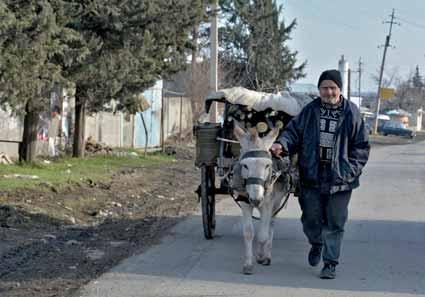
Six local projects in three regions will continue through May 2023, covering the following areas of municipal development:
1. Tskaltubo Municipality (Imereti region): A recreational venue will be organized at the Niko Lortkipanidze Museum located in Chune village. After exploring the museum and the surrounding park, visitors will be able to have a restful break in a comfortable environment, charge their mobile phones, and enjoy free wifi access.
2. Zestaponi Municipality (Imereti region): Four kindergartens will be equipped with a play-and-learn inventory to assist children in learning and physical activities.
3. Lagodekhi Municipality (Kakheti region): A multifunctional space will be created and equipped at the library of the newly renovated Lagodekhi Museum,
Tbil-State Turns 105!
BLOG
If you say you go to Penn-State, you mean you are a student of the Pennsylvania State University.
Couldn’t we, by this fun analogy, give to our beloved Ivane Javakhishvili Tbilisi State University the lovely brief appellation of “Tbil-State”?
Said Tbil-State is ranked number 776 on the list of Best Global Universities, based on its performance in compliance with widely accepted indicators of excellence. And this most prestigious school of Georgia has a new leader: On the 27th of December, the Academic Council of the Tbilisi State University elected its 30th Rector, Academician Jaba Samushia, 51, a well-known Georgian politician and public figure.
The University has a 30,000-strong student body, educated by a 3000-strong qualified faculty, operating within seven departments and 60 scientific centers and research laboratories. Its famous laboratory contains more than four million books and periodic publications at the disposal of its fortunate students and teachers. The University possesses its own publishing house and a newspaper with an 85-year history. The historic two white buildings of our Tbil-State, making up the hub of its urban campus, shine right in the heart of Tbilisi, triggering the warmest feeling of affiliation in all of us, whether we went to TSU or not. Yes, it is a genuine all-Georgian Alma Mater, so perfectly and expressly reflected in its famous coat of arms, one of the University’s finest attractions, showing a deer nursing its baby doe, and effectively symbolizing the perpetual notion of the nurturing mother of studies.
Keeping up the idea of education, along with the honorable tendency to venerate the founders of Tbilisi State University, come as no accident. The story belongs to time immemorial, and is part of the historically reared and strengthened mindset of this nation, based on the ancient academic processes carried out in this blessed land. This cherished and elevated tradition is still in place and it
continues healthily breathing within the walls of the University founded by Ivane Javakhishvili and other Georgian geniuses like him.
Celebrating this year its 105th anniversary, Georgia is poised to have a say, in it this way or that, the notion of TSU being an integral part of our soul, culture and everyday life. No other school will ever be able to take such a moral and
spiritual place in the lives of our people, and it needs to be handled with utmost care and calculated subtleness, because the phenomenon of Tbilisi University is not only about education and a subsequent piece of cardboard, called a diploma, but about the unfading intricacies of national pride and mentality.
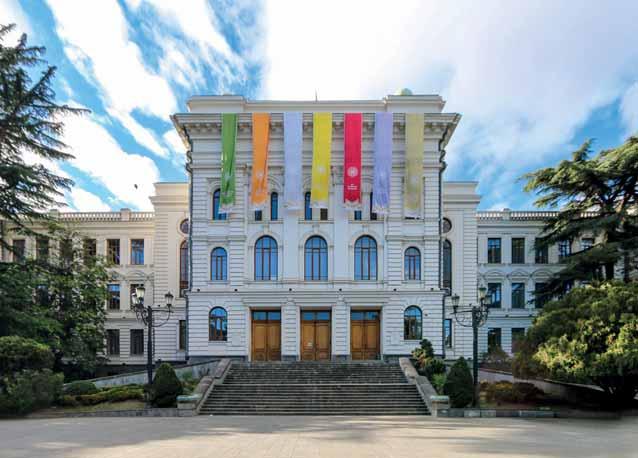
It all started in 1918, with only 369 students and voluntary attendants, enlight-
ened by just seven full and five assistant professors, three instructors and two scientists. Not exactly a big deal of course, but a huge national endeavor to push forward a young republic beleaguered by revolutionary fluids and warmongering attempts. The famous Harvard started with analogous numbers, though it did so as early as 1636, and currently functions with a $51 billion endowment, making it the wealthiest academic institution in the world. For comparison, Tbil-State spends something like $40 million a year, though the comparison is quite irrelevant at this point, because Tbilisi State University might have much higher specific gravity in our cultural life than Harvard does in America.
Anyways, the main day of celebration of Tbil-State’s 105th birthday, the 8th of February, was full of interesting events: Decorating with wreaths the graveyard busts of the University’s founding fathers at the site of its pantheon; attendance of a mass at the Davit Agmashenebeli Chapel, built and functioning right on the campus; sporting events like street football and a chess competition; a book exhibition and a display of art work created by Tbil-State students and teachers; the dedication of special conference halls, named after well-deserving meritorious professors of the past; the inauguration of a new sports hall; the presentation of a special jubilee stamp; and, finally, a wonderful concert, accompanied by award giving and jubilee speeches. The Ivane Javakhishvili Tbilisi State University, new alias Tbil-State, continues its full and boisterous academic life, now headed by its young new rector, vigorously working on one of the loftiest of goals, which is rendering our youth, the future of Georgia, a chance to take better care of this nation when their time comes.
GEORGIA TODAY FEBRUARY 10 - 16, 2023 9
SOCIETY
In Telavi. Photo by Tamar Amirgulashvili/UNDP
In Lagodekhi. Photo by Davit Khizanishvili/UNDP
Ivane Javakhishvili Tbilisi State University
BY NUGZAR B. RUHADZE
wrAIte Something for Me
In conclusion, pareidolia is a phenomenon that has been studied by a variety of researchers. It is thought to be an evolutionary adaptation, a result of the brain’s tendency to seek out patterns, and a byproduct of the brain’s tendency to seek out familiar objects and faces. While it can have both positive and negative effects on individuals, it can also be a sign of the unconscious mind attempting to communicate a message to the conscious mind.
This was it, I confess: My use of Chat GPT (found at www.chatgptonline.net) to “Write a 700 word essay on the subject of pareidolia. Include examples, theories of causation, and quotes from literature”. I changed nothing from the generated text, on this favorite subject of mine, which was a bit less in word count than I asked for but took about 30 seconds to appear on my screen, sentence by sentence. It’s clearly not ME, although apparently I could train it to sound just like me by giving it a lot of sample text from me (e.g. 12 years of weekly articles for Georgia Today!). Or I could have it sound like any other writer in a similar fashion… But! Running the essay through www.check-plaigiarism. com came up with a score of “100% plagiarized”… So there’s that. I couldn’t submit this piece to a university as my work - it would be flagged as copied and I would be warned or otherwise sanctioned. The example photos are mine, as usual: I didn’t take the extra step of generating those, although I could have done this too. Welcome to the quickly evolving world of computer-generated everything.
BLOG BY TONY HANMER
Pareidolia is a term used to describe the phenomenon of perceiving a meaningful pattern or recognizable object in an otherwise random or unrelated stimulus. This psychological phenomenon is often described as the ability to recognize faces, objects or images in random or chaotic patterns, such as clouds, rocks, or tree bark. It is a form of apophenia, the human tendency to see patterns or connections in random or unrelated data. While pareidolia is often associated with religious or supernatural experiences, it is a phenomenon experienced by people of all backgrounds and beliefs.
The concept of pareidolia first arose in the early 19th century when German
scientist Johann Wolfgang von Goethe wrote about his experience of perceiving faces in the moon. Since then, the phenomenon has been studied by a variety of researchers and has been linked to various psychological and neurological theories.
One of the most prevalent theories of pareidolia is that it is an evolutionary adaptation that helped our ancestors recognize threats in their environment.




For example, the ability to detect a face in a cloud or a tree branch may have helped them recognize predators. This theory is supported by research showing that the ability to perceive patterns in random images is more pronounced in individuals with heightened vigilance.
Another theory of pareidolia is that it is a result of the brain’s tendency to seek out patterns. This is known as the Gestalt principle, which postulates that humans perceive objects as organized wholes,
rather than as a collection of parts. This tendency to seek out patterns is thought to be a natural part of human cognition. Finally, some researchers have suggested that pareidolia is a byproduct of the brain’s tendency to seek out familiar objects and faces. This theory is based on the idea that humans are naturally drawn to things that are familiar, such as faces. This theory is supported by research showing that people are more likely to recognize faces in random images when presented with a familiar face. Pareidolia can have both positive and negative effects on individuals. On the one hand, it can help people recognize potential hazards in their environment. On the other, it can lead to false positive interpretations of random images, which can lead to unfounded conclusions.
As the psychoanalyst Carl Jung wrote, “It would be a mistake to regard pareidolia as an entirely pathological phe-
nomenon. It is, on the contrary, an expression of the fact that an unconscious content is pushing its way into consciousness.” In other words, pareidolia can be a sign of the unconscious mind attempting to communicate a message to the conscious mind.
Tony Hanmer has lived in Georgia since 1999, in Svaneti since 2007, and been a weekly writer and photographer for GT since early 2011. He runs the “Svaneti Renaissance” Facebook group, now with nearly 2000 members, at www.facebook.com/ groups/SvanetiRenaissance/
He and his wife also run their own guest house in Etseri: www.facebook.com/hanmer.house.svaneti
GEORGIA TODAY FEBRUARY 10 - 16, 2023 10 SOCIETY
Better and Safer Roads for Georgia: Georgia Launches Nationwide Road Safety Campaign with EU Support

With the support of the European Union and the European Investment Bank (EIB), the EU’s Bank, the Ministry of Regional Development and Infrastructure and the Ministry of Internal Affairs of Georgia launched a joint campaign called “Better and safer roads for Georgia” in order to raise awareness on road safety issues.
Car accidents are one of Georgia's leading causes of fatalities and injuries. Not maintaining a single lane, speeding, and driving under the influence of alcohol are some significant causes of road accidents in Georgia. The safe transportation of infants and toddlers is also crucial. In the last two years 15,222 persons have been injured during car accidents and 879 persons died, among them 22 children.
“We are building better and safer roads in Georgia together with our partners at EIB as well as in the Government. The communication campaign we have launched can reduce road accidents in Georgia. Too many lives are being taken away every year through accidents that could have been avoided. It is our common responsibility to make the driving environment safer for all people living in Georgia,” said Pawel Herczynski, Ambassador of the European Union. “Systematically preventing deaths and
serious injuries linked to road crashes is a priority of the EIB, the EU’s bank, which provides finance and expertise for investment projects worldwide,” said Maciej Czura, the Head of the EIB Regional Representation for the South Caucasus. “Improving road infrastructure safety in Georgia has been one of our key priorities since 2007 when the bank began operating in the country. In order to achieve that, the EIB is supporting the Georgian East-West highway project with EUR 1 billion financings guaranteed by the European Union, supplemented with up to EUR 40 million of EU grants to Georgia.”
“The Ministry of Regional Development and Infrastructure of Georgia, together with the Roads Department, has established a great partnership with the EU and its bank, the EIB, throughout the years,” said Koba Gabunia, Deputy Minister of the Ministry of Regional Development and Infrastructure of Georgia. “We are sure that the road infrastructure projects implemented within this partnership will allow us to develop the Road Connectivity Network in line with international standards, which will also contribute to road safety improvement. The safety components foreseen by us within the international projects will lead us to important results in terms of road traffic safety in the country.”
“Ensuring road traffic safety is a prior-
PUBLISHER & GM
George Sharashidze
COMMERCIAL DEPARTMENT
Commercial Director: Iva Merabishvili
Marketing Manager: Natalia Chikvaidze
EDITORIAL DEPARTMENT:
Editor-In-Chief: Katie Ruth Davies
ity for The Ministry of Internal Affairs. While developing the road infrastructure and implementing multiple reforms, accidents on roads and car crashes remain as a challenge. The government made significant legislative changes in 2022 in terms of road safety. The coordinated approach and joining forces will lead us to the improvement of road traffic safety in the country,” Alexandre Darakhvelidze, Deputy Minister of the Ministry of the Internal Affairs, claimed.
The campaign, with the tagline #DoNotRepeatMistake is focused on several concrete issues to raise awareness of the importance of road safety. It will show real stories of real people affected by road accidents. Outdoor banners with road safety messages will be spread throughout five cities of Georgia - Tbilisi, Khashuri, Kutaisi, Zestafoni and Batumi. This will be complemented by outreach through television, online media and social media. The goal is to reach as many drivers as possible and help them become aware of safety risks on the roads.
The road safety campaign is financed by the European Union and its bank, the European Investment Bank, within the framework of the Georgia Transport Connectivity project (GTC). The project aims to enhance Georgia’s connectivity to Europe while reinforcing the safety and quality of the country’s road networks.
Journalists: Ana Dumbadze, Vazha Tavberidze, Tony Hanmer, Emil Avdaliani, Nugzar B. Ruhadze, Michael Godwin, Ketevan Skhirtladze, Mariam Mtivlishvili, Erekle Poladishvili
Photographer: Aleksei Serov
50+
Street Cats and Dogs Are Being Fed Daily in Batumi as Part of an EUSupported Initiative
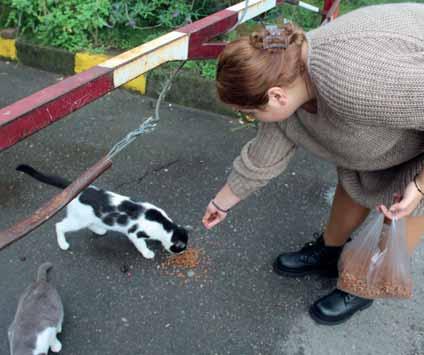
Free-roaming cats and dogs are inseparable from the urban fabric of many cities in Georgia, and now, in Batumi, action is being taken to help them.
Members of the youth club "Eureka," established at the Black Sea College, decided to draw public attention to the need to take care of these stray animals and began a campaign to give over 50 cats and dogs daily ratios of food.
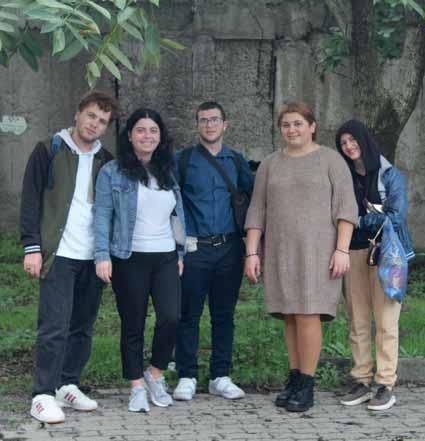
This initiative is part of the ‘Month of
Good Deeds’ announced by Sunny House, a non-formal education youth center, with support from the European Union Delegation to Georgia and the United Nation Development Program (UNDP) Georgia. Nine colleges and vocational schools joined the campaign. The EU and UNDP joint project for ‘Lifelong Learning Opportunities Through Local Partnerships’ promotes non-formal education and helps young people to unlock their talent and potential.
Website Manager/Editor: Katie Ruth Davies
Layout: Misha Mchedlishvili
Webmaster: Sergey Gevenov
Circulation Managers: David Kerdikashvili, David Djandjgava
ADDRESS 1 Melikishvili Str.
Tbilisi, 0179, Georgia
Tel.: +995 32 229 59 19
E: info@georgiatoday.ge
F: GeorgiaToday
ADVERTISING & SUBSCRIPTION
+995 555 00 14 46
E-mail: marketing@georgiatoday.ge
Reproducing material, photos and advertisements without prior editorial permission is strictly forbidden. The author is responsible for all material. Rights of authors are preserved. The newspaper is registered in Mtatsminda district court.
Reg. # 06/4-309
GEORGIA TODAY FEBRUARY 10 - 16, 2023 11 SOCIETY GEORGIA TODAY



































